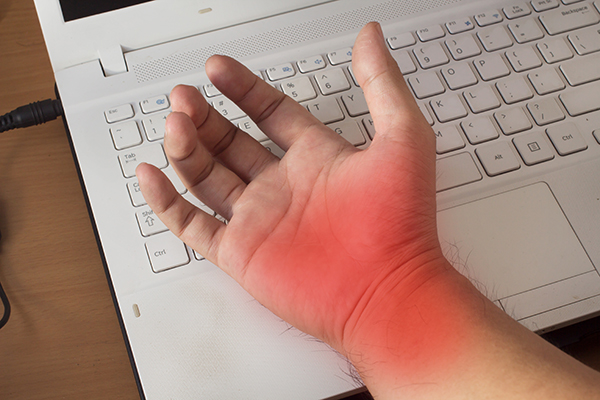Is it Carpal Tunnel?

By Melinda Jermer- Gu OTR/L, MEd
A tingling sensation or pain in the hand may be carpal tunnel syndrome, but it could also be indicative of other problems as well. That pins and needles feeling and/or numbness, is often a sign of nerve irritation due to inflammation or pinching.
The nerves in our fingers start at the spinal cord, arising from the nerve roots which then branch into trunks, cords (the brachial plexus) and finally into the median, radial, and ulnar nerves. As the nerves run to our fingers they must go around bony areas, through/near muscles and near other soft tissues until they reach their target area. Simply put, the nerves for your hand and fingers starts at the spinal cord, pass into the shoulder area, go down the arm, over /next to the elbow and then to the wrist (at three different sites) and finally to deep hand muscles. A nerve can get pinched at any spot along this path. A tingling in the hand can be caused by a pinched/irritated nerve at the wrist (carpal tunnel), the elbow (cubital tunnel), the shoulder area or the neck. A bulging disk, commonly called a herniated disk, can push on a nerve and cause irritation that may cause a burning, stabbing or a tingling feeling down the arm.
Carpal tunnel syndrome is the diagnosis given when the median nerve is being pinched at the wrist. The area is called the carpal tunnel and thus the diagnosis of carpal tunnel is given. The area the median nerve must pass through to innervate your fingers is very small and shares the space with the finger muscles. If there is swelling, due to repetitive or tight gripping, the median nerve can become irritated. The median nerve can also become irritated if pressure is applied over it, such as when you rest your wrist, for long periods of time on the edge of a table or laptop computer.
Carpal tunnel typically causes a tingling sensation in your thumb, index, and middle finger. You may find the tingling and numbness are worse after typing at the computer or after griping and carrying a heavy bag. In severe cases you may awaken due to severe pain/tingling or numbness in your hands. Cubital tunnel is due to irritation of the ulnar nerve as it passes on the side of your elbow (the bony bump opposite your funny bone). This nerve may become irritated if you lean on your elbows or keep them bent for long periods of time. You may find that your ring and small finger tingle or go numb.
Numbness and tingling can also sometimes be a secondary effect of diabetes. When diabetes causes nerve damage, the person usually feels constant numbness in the feet, hands, or fingers (neuropathy). If you are diabetic and are having these symptoms, you should talk to your doctor so that he or she can evaluate your condition and appropriately adjust your treatment.
When a patient comes to Sheltering Arms Outpatient Physical or Occupational Therapy with reports of a tingling in one hand, our first task is to determine where the nerve is being pinched. The location of the tingling gives us the first clue as to where the problem is located, and this information, along with the results of other special tests we complete, helps to identify where the nerve is being pinched. Once we know the origin of the tingling sensation, our therapists can begin treatment to reduce and hopefully eliminate the discomfort.
If you have been experiencing any of the above issues or have an impairment of the wrist or hand, see your Doctor for a work up to determine if a visit to the Sheltering Arms Physical or Occupational Therapy would be helpful. Once you have been given a diagnosis and a prescription, call 804-764-1000 to schedule and assessment with a hand therapist at Sheltering Arms.